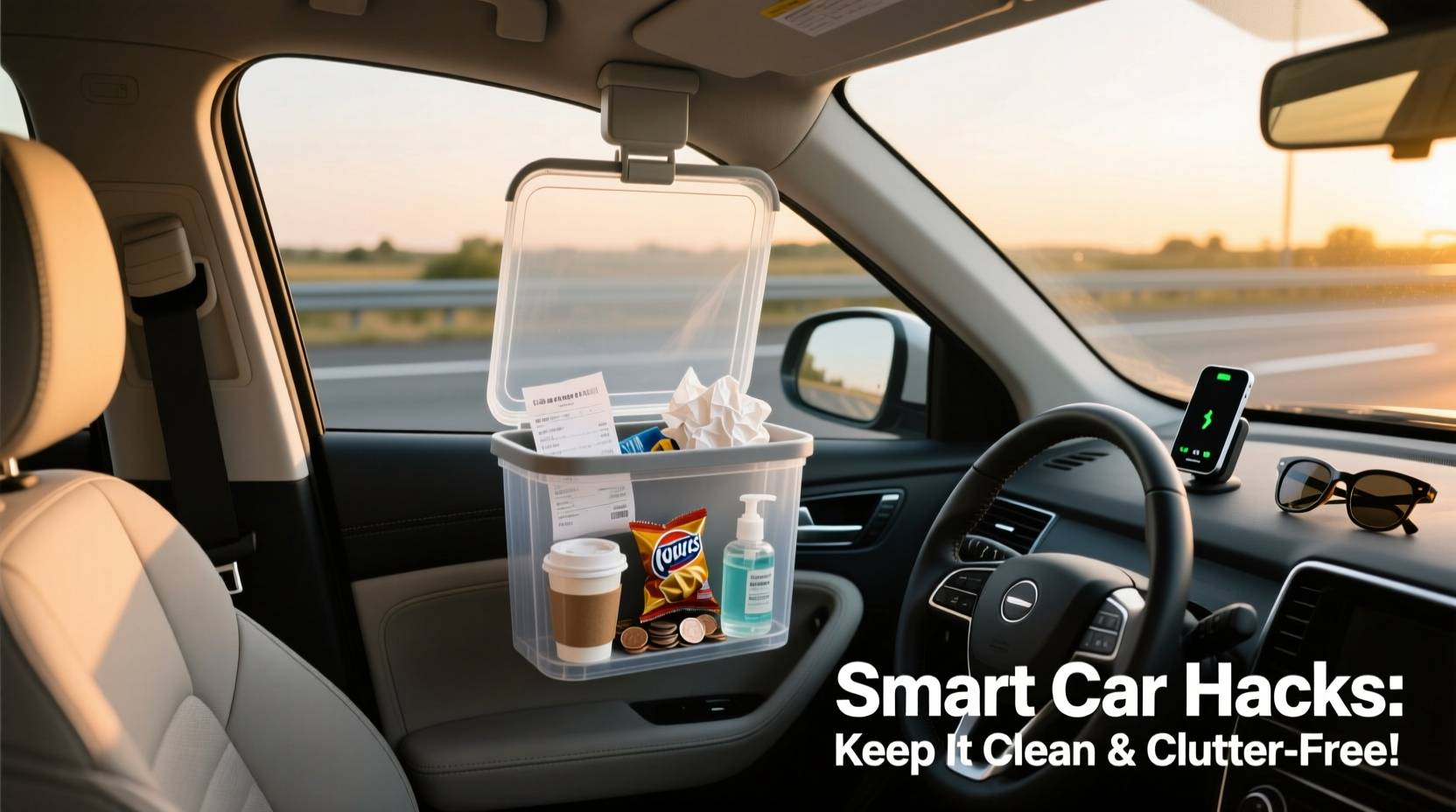A clean, organized car isn’t just about appearances—it’s about safety, efficiency, and peace of mind. Clutter on the floor, loose wrappers under seats, and forgotten receipts floating in the breeze can distract drivers, reduce usable space, and create an unhygienic environment. One surprisingly effective solution? A simple hanging trash bin. Often overlooked, this small tool can be the cornerstone of a streamlined vehicle interior. When used strategically, it helps contain waste, organize essentials, and prevent messes before they start.
Modern cars are multifunctional spaces—commuting offices, snack stops, gym shuttles, and family transporters all in one. With so much activity, keeping things tidy becomes a daily challenge. The key is not just cleaning but designing systems that make organization effortless. A hanging trash bin is one such system: low-cost, easy to install, and highly effective when paired with smart habits.
Why a Hanging Trash Bin Makes a Difference

Unlike traditional cup holders or glove compartments, a hanging trash bin is designed specifically to catch what you don’t want accumulating in your car. Positioned typically on the back of a front seat, it stays out of the driver’s way while remaining accessible to passengers. It prevents trash from rolling around, reduces odors by containing food scraps, and discourages littering—both inside and outside the vehicle.
More than just a waste holder, today’s models often come with additional pockets for tissues, hand sanitizer, phone chargers, or even snacks. This transforms them into mini organizational hubs. Studies show that visual clutter increases stress levels during driving; removing loose items can improve focus and reaction time. According to Dr. David Lewis, a cognitive psychologist specializing in human behavior, “A well-organized environment supports better decision-making and reduces mental fatigue.” That applies as much behind the wheel as it does at a desk.
“Small interventions like designated storage zones significantly reduce perceived chaos in confined spaces.” — Dr. Lena Torres, Environmental Psychologist
Choosing the Right Hanging Trash Bin
Not all hanging bins are created equal. Selecting the right one depends on your car’s layout, usage patterns, and personal preferences. Consider these factors before purchasing:
- Size and Capacity: Opt for compact designs if you drive solo or have limited rear legroom. Larger families may benefit from bins with higher volume or dual compartments.
- Mounting Style: Most hang over headrest posts, but some use suction cups or seat anchors. Ensure compatibility with your seat type (e.g., integrated headrests may limit options).
- Material: Durable polyester or water-resistant nylon resists spills and odors. Avoid flimsy plastics that tear easily.
- Extra Features: Look for side pockets, zip closures, odor barriers, or removable liners for easier cleaning.
Comparison: Popular Hanging Bin Types
| Type | Best For | Pros | Cons |
|---|---|---|---|
| Basic Mesh Bag | Light users, short commutes | Inexpensive, breathable | No odor control, hard to clean |
| Waterproof Bucket Bin | Families, pet owners | Spill-proof, easy wipe-down | Bulkier, less pocket space |
| Multi-Pocket Organizer | Rideshare drivers, frequent travelers | Stores supplies + trash | Pockets fill up quickly |
| Foldable Silicone Bin | Seasonal use, minimalist drivers | Collapsible, hygienic | Limited capacity |
Step-by-Step: Installing and Optimizing Your Bin
Maximizing the effectiveness of your hanging trash bin requires thoughtful setup and routine use. Follow this sequence to integrate it seamlessly into your car’s ecosystem:
- Choose the Right Location: Hang the bin on the back of the passenger seat if you drive alone. For families, place it behind the driver’s seat for easy access by rear passengers.
- Install Securely: Loop the straps firmly around the headrest poles. Give it a gentle tug to ensure stability. Avoid placing near airbag zones or obstructing seatbelt paths.
- Line It (Optional): Use a small compostable bag or reusable silicone liner to ease disposal and prevent residue buildup.
- Assign Zones: Dedicate pockets: one for tissues, another for sanitizers, maybe a slim slot for pens or parking tickets.
- Set Household Rules: Train passengers—especially children—that all wrappers, napkins, and disposables go into the bin immediately.
- Schedule Emptying: Empty daily or every other day, depending on use. Rinse and wipe weekly.
Real-Life Example: How One Family Transformed Their Minivan
The Ramirez family of five used their minivan heavily—school runs, soccer practices, weekend trips. Within days, the cabin would accumulate juice boxes, chip bags, and crumpled permission slips. “We were constantly stepping on something,” says Maria Ramirez, a high school counselor. “And the smell after a melted granola bar was unforgettable.”
After installing a waterproof hanging bin with multiple compartments, they assigned roles: the kids deposited trash, her husband refilled tissues, and she emptied it every evening. Within a week, the van stayed visibly cleaner. They added a small magnetic whiteboard on the dash listing “Bin Check” as part of their nightly routine. Six months later, they estimate they’ve reduced interior cleanup time by 70% and eliminated three deep cleans they previously needed each month.
“It sounds minor,” Maria adds, “but having one spot for everything made us all more responsible. Even our dog’s treats go in a labeled pouch now.”
Pro Tips to Prevent Common Pitfalls
Even the best tools fail without proper habits. Avoid these common mistakes that undermine your organizing efforts:
- Overfilling the Bin: When it’s full, people stop using it. Set a rule: once it’s half-full, it gets emptied.
- Ignoring Odor Control: Place a charcoal deodorizer packet or a few drops of essential oil on a cotton ball inside the bin liner.
- Mixing Trash with Valuables: Never store keys, wallets, or electronics in the same compartment as garbage. Use separate pockets deliberately.
- Forgetting Seasonal Adjustments: In winter, switch to insulated bins if storing drinks. In summer, avoid leaving sealed bins in direct sunlight to prevent bacterial growth.
Monthly Car Organization Checklist
- ✅ Empty and sanitize hanging trash bin
- ✅ Wipe down all storage pockets
- ✅ Check for expired items (snacks, wipes)
- ✅ Vacuum floor mats and seat crevices
- ✅ Reassess bin placement and adjust if needed
- ✅ Replace any worn liners or damaged straps
Frequently Asked Questions
Can I use a hanging trash bin in a leased or rental car?
Absolutely. Since most bins require no installation beyond looping over headrests, they’re non-invasive and leave no marks. Just remove them before returning the vehicle.
What should I do if the bin starts to smell?
First, empty it immediately. Wash the interior with mild soap and water, then dry thoroughly. Insert a natural deodorizer like baking soda or activated charcoal. If the odor persists, consider switching to a machine-washable or silicone model.
Are there eco-friendly options available?
Yes. Many brands now offer bins made from recycled fabrics or biodegradable materials. Pair them with compostable liners or reusable cloth bags to minimize environmental impact.
Transform Your Drive Starting Today
A hanging trash bin is more than a convenience—it’s a commitment to order, cleanliness, and mindfulness in your daily commute. By containing waste, organizing essentials, and encouraging responsible habits, it turns chaotic rides into calm, controlled environments. The best part? It takes less than five minutes to install and costs less than a tank of premium gas.
You don’t need a full interior overhaul to make a difference. Start with one simple change: hang the bin, set the rules, and stick to the routine. Over time, you’ll notice fewer distractions, less stress, and a car that feels like an extension of your personal space—clean, functional, and ready for whatever the road brings.









 浙公网安备
33010002000092号
浙公网安备
33010002000092号 浙B2-20120091-4
浙B2-20120091-4
Comments
No comments yet. Why don't you start the discussion?